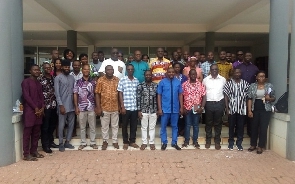 Attendees at the 2023 national budget dialogue which took place at UDS
Attendees at the 2023 national budget dialogue which took place at UDS
The Centre for Agriculture Productivity Policy Studies (CAPPS) of the University for Development Studies (UDS) has advocated for the allocation of ten percent (10%) of the national budget expenditure to the Agricultural sector to accelerate agriculture growth and transformation.
This would help to restructure the sector to boost food security as well as create the required decent job to enhance national GDP of the country. The 1.24 percent of public expenditure allocated to the agriculture sector is said to be woefully inadequate to provide the needed resources to support the sector thereby hampering the activities of the sector players and as well making it unattractive to the youth to venture.
Also, that of the 2022 budgetary allocation to agriculture sector thus Ministry of Food and Agriculture and Ministry of Fisheries and Aquaculture Development combined was 0.81% instead of 10% proposed by Malabo declaration while that of 2023 budgetary allocation was 1.24% instead of 10%.
The advocacy was made at the 2023 national budget dialogue on agro-based intervention held at the Nyankapala campus of UDS. The event was to capacitate the industry players on agro-based interventions contained in the 2023 national budget so that they can demand for their portion of the national cake and
accountability from duty bearers.
Also, it was to present agriculture sector performance and expenditures and proffer recommendations from the 2023 national budget and get inputs from discussants and participants on the ways forward.
CAPPs was established in January 2023 to conduct demand-driven research in the area of agriculture productivity and policy analysis so as to sustain agriculture development in Ghana and Africa at large with the operational areas being research and publications, training and teaching, agricultural extension, outreach and policy.
The centre brought together experts from the various departments of the university and other institutions and agencies to deliberate on the budget presented by government on agriculture.
Research Scientist at CSIR-Water Research Institute, Fisheries and Aquaculture Division, Dr. Emmanuel Magna stressed the need for government to focus on the fish health, hatcheries and feed as it is one of the critical areas affecting aquaculture development in Ghana.
"That the fisher sector has the capacity to create job opportunities if a policy is designed to support the industry players", he said.
Senior Research Scientist at CSIR-Technology Policy Research Institute (STEPRI),Dr. Justina Adwoa Onumah said there is the need for co-ordination of agriculture sector interventions. She also stressed the need for government to provide technology innovations such as improved seeds and fertilizers and extension come as a package.
“For One-District-One-Factory to work, then Planting for Food and Jobs (PFJ) has to work” she stated.
The Dean for Faculty of Agriculture, Food and Consumer Sciences at UDS, Prof. Terry Ansah stressed the need for the breeders to breed more sustainable livestock for production to curb the importation.
The Moderator, Prof. Joseph A. Awuni called for other Research Institutions to emulate CAPPS to make critical contributions to government policies. The Director of CAPPS at UDS, Dr. Franklin N. Mabe, said, the amount allocated to the agricultural sector is very minimal and fails to meet the minimum threshold of 10% contained Malabo declaration.
He advised agribusiness enterprises and private investors to contact the appropriate government agencies to benefit from the agriculture interventions contained in 2023 budget while NGOs and Civil Society Organisations should demand accountability from appropriate agencies and duty-bearers.
"NGOs should use the interventions contained in the budget as the basis to design their project entry point", he added.
He stressed the need for industry players such the academia, researchers, farmers, the private sector, agribusiness enterprises, NGOs, Civil Society Organizations among to get involved in disseminating government policies for inclusive engagement.